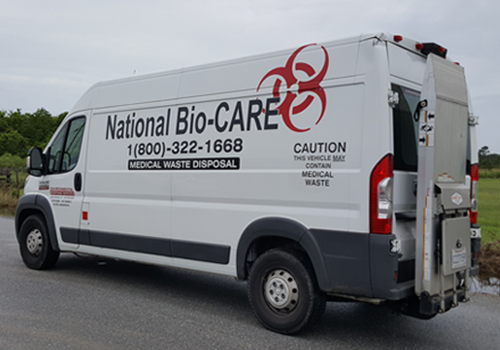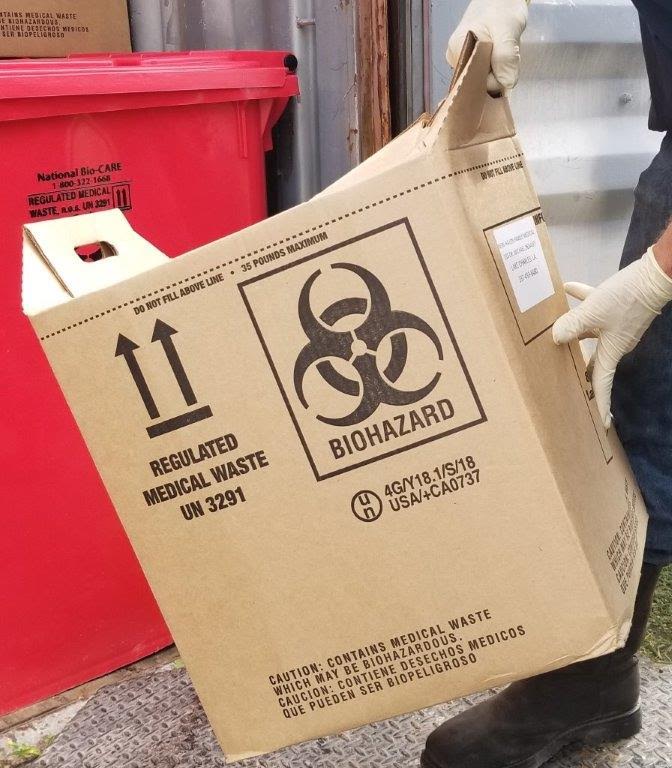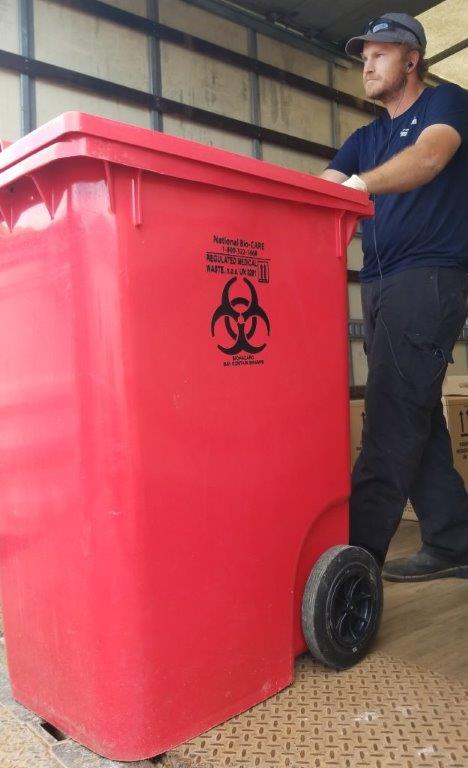
New Orleans, Louisiana
For over 20 years we have been providing wide range of medical waste disposal services. Family owned and customer driven, we are rooted in the communities we serve.

Medical Waste
Simple, uncomplicated, solutions for your medical waste, with no hidden fees, using HIPPA secure manifesting system.

Pharm Waste
You got enough to think about! We provide cost efficient “Cradle to Grave” compliance for your expired medicine and Pharmaceutical

OSHA Compliance
Training and certification you need. Easy sign up with interactive programs keeping you company and employees in compliance.
National Bio-CARE Quote Submission
Trusted, Reliable, & Professional
EPA Approved Treatment Facility & Modern Fleet
Family-Owned & in Operation since 1997
Fully Trained, Licensed, and Uniformed Drivers


Looking for medical waste disposal companies in New Orleans? National Bio-CARE is your answer. We specialize in red bag, biohazard, and sharps disposal.
Medical waste, which can include potentially infectious bodily fluids, used needles, and dangerous chemicals among other things, can pose a serious threat both to public health and to the environment. New Orleans, with its low elevation and already polluted waterways, is especially vulnerable to a public health crisis if medical waste is not disposed of safely. In order to keep the city safe and remain in compliance with federal and state regulations, most healthcare, veterinary, and medical research facilities in New Orleans entrust their waste to a licensed medical waste disposal company.
Federal And State Regulations
Medical waste disposal in New Orleans is regulated by three different agencies: the Louisiana Department of Environmental Quality, which regulates the disposal of infectious waste; the Louisiana Department of Health and Hospitals, which stipulates how medical waste must be packaged, stored, transported, and ultimately, disposed of; and finally, the Occupational Safety and Health Administration (OSHA), a federal agency which imposes specific rules on the treatment of blood-borne pathogens. By employing medical waste disposal companies, medical facilities can both comply with federal and state regulations and also protect the safety of their employees.
What Constitutes Medical Waste
Medical waste refers to any potentially infectious or dangerous waste material generated by any type of health care, veterinary, or medical research facility. First of all, any type of bodily fluid or body part, such as an organ or limb that has been removed, is a form of medical waste that must be contained and disposed of safely. In addition, when a soft disposable material such as an exam glove, a bandage, an exam table cover, a paper gown, or a swab has been in contact with any type of bodily fluid, it is considered contaminated and must also be treated as a biohazard. Sharps are another type of medical waste. These include needles, lancets, and surgical instruments that have been used and discarded. Without proper biohazard sharps container disposal, employees are at serious risk of injury and infection. Drugs, radioactive chemicals, and containers that have held them can also pose a risk to the public and must be disposed of safely. These are just a few examples of the items that biohazard waste disposal companies take care of on a regular basis.
The General Process Of Disposal
The process of biohazard waste disposal involves the following steps: collection and storage, transportation, and treatment or disposal. The handling of medical waste is highly regulated by OSHA and state agencies to ensure the safety of workers as well as safe containment of hazardous materials. Materials must be separated into categories (e.g., infectious waste, sharps, and chemical waste) and then placed into appropriate containers, such as a red biohazard bag or a puncture-proof sharps container. Containers must be labeled with specific information that includes the type and amount of waste in the container, a standard international symbol to identify the type of waste, the name of the facility where the waste was generated, and the date when it was packaged.
Once medical waste has been packaged and labeled, it can be transported to a waste disposal facility. Facilities that generate large amounts of waste, like hospitals, typically prefer to employ a service that will pick up and transport the waste. Vehicles that transport hazardous waste must be specifically designed to hold and protect their cargo, with a locked cargo compartment and appropriate equipment for safely cleaning an accidental spill. Smaller facilities that generate less waste may prefer a service that accepts medical waste shipped via the U.S. Postal Service. When the waste material reaches the facility, it will be treated or disposed of in one of several ways, depending on the type of waste.

Medical Waste Disposal Techniques
One of the most common methods of treating medical waste is incineration, which involves using very high heat to destroy any organic pathogens that are present. This method converts the waste material to gas or ash, which may need further treatment before it can be released into the environment. Incineration is highly effective in killing all types of viruses and bacteria; however, it can harm the environment by generating carcinogenic chemicals as well as toxic heavy metals when materials are not incinerated sufficiently or when the wrong materials, such as plastics, are burned.
Autoclaving is one of the most popular methods of treating non-organic waste, such as sharps and test tubes. An autoclave is a machine found in most laboratories, and it uses high-pressure, very hot steam to sterilize equipment. When plastics are autoclaved, they are generally melted down completely and recycled. This method is not recommended for pathological waste. Another disposal method that involves heat is micro-waving wet waste (water is added if dry) to a high enough temperature to kill organic material.
A method of treatment and disposal that doesn’t require heat is a chemical treatment that uses bleach and other chemicals not only to kill pathogens but also to change the chemical structure of the waste so that it is rendered non-hazardous. All of these methods, except for incineration, allow for the possibility of recycling materials.
Risks Of Improper Disposal Of Medical Waste
Before biohazard disposal was regulated, medical facilities simply packaged medical waste in plastic bags or boxes and threw it out with the rest of the trash. Unfortunately, this led to the spread of many diseases throughout the population. If modern facilities fail to comply with regulations for red biohazard bags disposal or disposal of other biohazard materials, they not only risk endangering the public and their employees, but they will also face legal accountability for any damage caused by their neglect, financial loss in paying for those damages, and a loss of reputation. For these reasons, medical facilities in New Orleans need a licensed and experienced medical waste disposal service that they can rely on.
Testimonials
We are committed to our clients and making sure they receive nothing but the best service from us. Here is what some of our clients are saying!
Frequently Asked Questions (FAQ)
Here are some of the questions people frequently asked. If you have a question that isn't addressed here, please give us a call at (877) 941-5001.
What do I do with the sharps containers?
Sharps are the needles, lances, scalpels, broken glass, etc. that are contaminated with blood or bodily fluids. These need to be placed in the approved sharps container. When full, close the top and secure with locking tab. Tape close to be sure the container doesn’t open during handling and transport. Place the full sharps container in provided disposal box or tote.
Why do you cost less than the other companies?
We charge you for the services you need, not for a bunch of stuff you don’t need and will not use. Additionally, We don’t have the overhead like the big boys in the market do. We use smaller trucks, so we are more efficient getting in and out medical offices and around town. We have less corporate heads to pay, and we operate as a small, family run, and locally operated company. This all adds up to savings passed on to the customer.
Do you provide the red bags?
We provide the cardboard disposal box which comes with a leak tight, red bag for you to put your exam room / lab area waste in. For the individual waste cans in each of the procedure areas, you should order those from your medical supply company, it’s less expensive and they carry a large quantity of different sizes.
How much does your service cost?
It depends on the type, quantity, and frequency of waste to be picked up, as well as location. Some of our services cost as little as $19.00 month. Some customers have the full suite of services, twice a month pick-up, with multiple containers and pay $350 a month. Please fill out the quote request form and we will contact you about your waste disposal needs.
Click Here to get a Fast, FREE Quote!
How Soon Can You Come?
Usually within 7 days. We have regularly scheduled, dedicated routes. We can place you on the soonest available pick up in your area. We also offer emergency, off route services as well. Please contact our Route Manager for more information.
What do I put in the medical waste transport container?
You should check with your company policy and procedures and see if this is specifically outlined. A broad answer to this is:
1) take the red bag form the individual rooms and secure it closed with tape, or tie a knot, then place in the container.
2) sharps container with lid closed, and taped to prevent accidental opening, can be placed in the transport box or tote.
What do I do with the expired pharmaceuticals, or drug samples?
PLEASE protect our environment and do not flush down the drain, Do not put them in the medical waste bins. Please contact our office and we will assist you. Most expired medicines can be disposed of with minimal effort. We have a special container for pharmaceuticals. Some of the schedule/classed drugs must be handled by a DEA approved contractor. Whatever you have we have your solution!
Contact Us
Ask@NationalBioCare.com
(877) 941-5001
The pandemic of COVID-19 has caused a strain on the United States healthcare sector. Moreover, it has put the economy in standstill and affected nearly every business. These types of biohazards are incredibly contagious and can cause an outbreak within your facility.
National Bio-CARE provides disinfection services targeting COVID-19 for dental, medical facilities, office complexes, retail, and restaurants. Facilities which use this service can advertise their place of work has been properly disinfected with a certificate of disinfection.
Since 1997, National Bio-CARE has provided biohazard remediation services.












